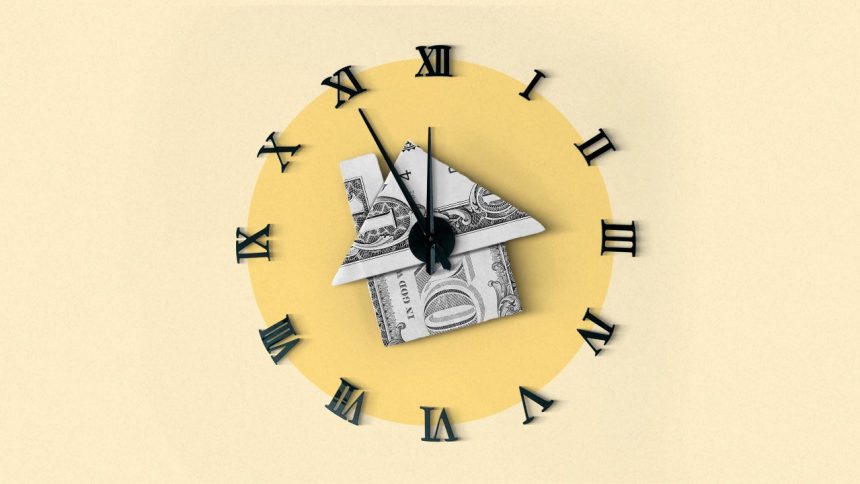Images by GettyImages; Illustration by Hunter Newton/Bankrate
Key takeaways
- When you prepay your mortgage, you pay extra toward the loan principal to help pay your loan off sooner and save money on interest.
- There are many ways to prepay a mortgage, including through biweekly payments, periodic extra payments or a lump sum.
- Before you make additional mortgage payments, consider whether your money might be better purposed elsewhere, such as retirement savings.
When you take out a mortgage, you’re agreeing to pay it back over years or even decades. That doesn’t mean you can’t pay it sooner, however. Here’s a look at how to prepay your mortgage, the benefits and drawbacks and how much you could stand to save.
How does prepaying your mortgage work?
Prepaying a mortgage simply means paying off your loan early. Normally, when you pay your mortgage, you send a specific amount to your mortgage servicer each month. That regular mortgage payment includes all the components of PITI, which stands for principal, interest, taxes and insurance.
When you pay extra on a mortgage, you’re paying above and beyond the regular monthly installment. The money you send is meant to apply directly to the loan principal, not the interest. This allows you to pay down your loan sooner and save money on interest.
Example: How much you can save with extra mortgage payments
Let’s say you take out a $400,000 mortgage at a 6.8 percent interest rate. The monthly mortgage principal and interest total $2,608. Here’s what happens if you make extra mortgage payments:
| Payment method | Time to pay off loan | Total interest | Total interest saved |
|---|---|---|---|
| $2,608 monthly | 30 years | $538,772 | $0 |
| $2,608 monthly plus one extra $2,608 payment a year | 24 years | $412,772 | $126,000 |
| $100 extra monthly | 27 years and 2 months | $469,589 | $69,183 |
| $50 extra monthly | 28 years and 4 months | $501,359 | $37,413 |
| $25 extra monthly | 29 years and 10 months | $519,258 | $19,514 |

Mortgage amortization calculator
Bankrate’s mortgage amortization schedule calculator can help you determine the impact of extra mortgage payments. Click the “Optional: Make extra payments” dropdown to calculate.
Visit the calculator
What is a prepayment penalty?
A prepayment penalty is a fee lenders charge when you pay off your mortgage early, typically a percentage of the loan principal. Most borrowers are not subject to a prepayment penalty, however. Still, before you put any extra funds toward the principal, review your closing disclosure to verify that there are no prepayment penalties tied to your loan.
How to prepay a mortgage
There are four primary ways to make extra payments on your mortgage:
- One extra payment once a year
- Biweekly payments
- Additional payments at your discretion
- Recasting
Whichever method (or combination of methods) you choose, make sure your servicer applies the extra payments toward the loan principal. If you don’t specify this, the additional money will go toward your next monthly mortgage payment instead, paying both principal and interest. This won’t help you achieve your goal of paying your loan off as early as you’d like, nor saving as much on interest.
1. One extra payment
You can prepay your mortgage by making one extra monthly payment once a year. Using the above example, you might choose to pay an extra $2,608 every January.
2. Biweekly payments
You can also prepay your mortgage with biweekly mortgage payments. With this method, you split your monthly payment in half and pay one half every two weeks. Over the course of a year, you’ll make 26 payments, which equals 13 monthly payments. In effect, you’d make an extra mortgage payment each year.
3. Additional payments
You can pay more toward your loan principal at any time, with any amount. Some borrowers do this with windfalls, like an unexpected bonus or inheritance. Others might opt to do this regularly by reviewing their monthly budget to determine whether they want to contribute any extra funds to their mortgage.
4. Recast your mortgage
If you have a large lump sum available to put toward your mortgage, you might consider recasting your loan. This involves paying the lump sum toward your loan, plus a fee. The lender then reamortizes your loan with a new payment schedule. You’ll have the same number of payments and years to repay, but a smaller sum to pay back. Plus, you’ll get to keep the same mortgage rate — a big potential benefit over refinancing, which might lock you into today’s elevated mortgage rates. Some lenders may not offer recasting, however, so you’ll need to see whether this is an option for your loan.
Should I pay extra on my mortgage?
Pros
- Save significant money on interest
- Pay your mortgage off sooner
- Build equity in your home faster
- Reduce your debt-to-income (DTI) ratio, which can make it easier to get other loans
- Get rid of private mortgage insurance (PMI) faster, if you’re currently paying for it
Cons
- Less money for saving, investing or other financial goals
- Ties up money in home, where it isn’t as easily accessible
- Smaller mortgage interest deduction
- Possible prepayment penalty
When deciding whether to pay extra on a mortgage, look at your entire financial picture. Here are some important questions to consider:
- Is your monthly budget tight after meeting necessary expenses? If so, you might not want to put your already-limited discretionary funds toward your mortgage, a relatively inexpensive loan.
- Is your income variable or unpredictable? If so, you might want to save those extra funds for the times when you don’t have as much coming in.
- How long do you plan to stay in your home? If you’re already close to paying off your mortgage, it might make sense to keep your payments as-is and put those funds elsewhere.
- Do you have an adequate emergency savings fund? If not, focus on building these savings first — at least three to six months’ worth of expenses.
- Are you saving enough for retirement? If you’re not sure if you’re saving enough, use our retirement calculator.
- Do you have credit card balances or other loans with higher interest rates? Because mortgages aren’t as expensive as other forms of debt, it often makes more sense to pay off credit cards or other loan balances before your home loan.
If you answered yes to any of these questions, it might be better to hold off on prepaying your mortgage until you’re more financially secure.
That said, “if it fits into your budget, you want to get rid of the debt and you’re in good shape with other savings or investing goals, make extra payments on your mortgage,” says Linda Bell, senior writer at Bankrate. “Every additional dollar shaves time off your loan and saves you interest.”
FAQ about prepaying your mortgage
-
Once you fully pay off your mortgage, you’ll lose the mortgage interest tax deduction. If you itemize your taxes and the deduction is an important savings tool for you, talk to a CPA before you start paying extra on your mortgage.
-
Prepaying your mortgage won’t have a direct impact on your credit score. However, as you pay off more of your loan, your balance will shrink, and your credit utilization ratio will change. This factor does affect your score.
-
Not usually. You can prepay as much as you’d like, or pay off your loan completely, at any time.
-
No. You’re still locked into the monthly payments you’ve committed to with your lender until you’ve paid off the loan in full.
Read the full article here















